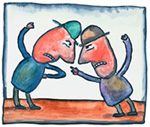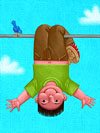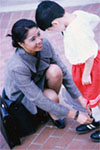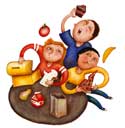|
By Brooke de Lench
Too often these days, parents feel they have no choice but to pack their child's schedules with adult-supervised, adult-driven activities such as organized sports. But, as a new report from the American Academy of Pediatrics (AAP) makes clear, such activities should not come at the expense of free and unstructured play, which is critical to healthy child development.
More >>
|
|
Sports Nutrition
|
|

A great first step to a healthier family is to include 5 to 9 servings of fruit and vegetables each day. A healthier family is also on the move; so include at least 30 minutes of moderate activity everyday, such as walking. These simple changes are easier than you think and help to improve your entire family's health. More>>
|
|
By Dr. Keith Wilson

I am often asked what it really looks like when parents get stuck in the Intensity Web. The following examples shows how parents can get caught up in their children's soccer game and lose focus, dramatically increasing the chances that they will act in ways that do not reflect their values.
More >>
|
|
By Brooke de Lench
 My sons were just five when they played on their first youth sports team. I can still vividly recall that night in April when the head coach called to tell me that they were on the T-ball "Red Sox" and that the first practice would be held at the high school softball field in two days. More>> My sons were just five when they played on their first youth sports team. I can still vividly recall that night in April when the head coach called to tell me that they were on the T-ball "Red Sox" and that the first practice would be held at the high school softball field in two days. More>>
|
|
By Suzanne Nelson, D.Sc., R.D.
Once children enter elementary school, they begin to develop eating patterns that are more independent of a parent's influence and scrutiny. New activities and peers begin to influence food choices as your child is exposed to a variety of new foods and different social situations. Your child's food choices will tend to be repetitious, so that the foods they include in their diets remain relatively constant over time. More>>
|
|
by Paige Stoyer
 Dr. Carol Frey, Assistant Professor of Orthopedic Surgery at UCLA and Chief of Foot and Ankle Surgery at West Coast Sports Performance in Manhattan Beach, California, says parents should remember the following when shopping for their children’s shoes:
More>> Dr. Carol Frey, Assistant Professor of Orthopedic Surgery at UCLA and Chief of Foot and Ankle Surgery at West Coast Sports Performance in Manhattan Beach, California, says parents should remember the following when shopping for their children’s shoes:
More>>
|
|
By Shane Murphy, Ph. D.
An interesting and useful way of thinking about the development of the young athlete has been proposed by Jon Hellstedt. Because it is impossible to look at the development of the young athlete without also taking into account the changes experienced by the parents and siblings, Hellstedt looks at the development of the young athlete as an issue for the entire family. More>>
|
|
 The Consumer Federation Of America makes the following recommendations to parents regarding bike helmet safety and use: A bike helmet should be worn on each and every ride. In some parts of the country, it's the law. Remember that serious crashes can happen close to home on short rides.
More>>
The Consumer Federation Of America makes the following recommendations to parents regarding bike helmet safety and use: A bike helmet should be worn on each and every ride. In some parts of the country, it's the law. Remember that serious crashes can happen close to home on short rides.
More>>
|
For a complete list of articles on Nutrition, click here. |
|

|
|
This is the age when most kids play organized sports for the first time, so it is absolutely critical that their experience is positive and that the emphasis be on skill development and having fun, not on winning. If it isn't, a kid may be turned off to sports, perhaps for the rest of his or her life. This section includes articles from experts and professionals to help you and your child get off to a successful start in organized sports, as well as advice and stories from veteran moms about their first experiences in youth sports. Share your stories, advice, or gripes with MomsTeam by emailing us .
|
|
By Shane Murphy, Ph. D.
 Wait a second! Isn't the title for this article incorrect? Surely I meant to say, "When is Your Child Old Enough to Participate in Youth Sports?" No. I would like you to seriously consider a question that rarely gets asked: How does the age of your child affect you as a parent watching your son or daughter compete? More>> Wait a second! Isn't the title for this article incorrect? Surely I meant to say, "When is Your Child Old Enough to Participate in Youth Sports?" No. I would like you to seriously consider a question that rarely gets asked: How does the age of your child affect you as a parent watching your son or daughter compete? More>>
|
|
By Dr. Leon James and Dr. Diane Nahl
Children are always learning and imbibing from their social environment. There is never time out when you're not influencing your kids by what your do and say. It is human to make mistakes such as swearing, forgetting a promise, or expressing prejudice. More>>
|
|
By Bridget Swinney
 There is an epidemic of overweight kids - and you don't have to read the newspaper or watch the news to find that out. Just take a look at kids at the mall or in the schoolyard. You can also see a shortage of kids outside playing, biking or running.
More >> There is an epidemic of overweight kids - and you don't have to read the newspaper or watch the news to find that out. Just take a look at kids at the mall or in the schoolyard. You can also see a shortage of kids outside playing, biking or running.
More >>
|
Make sure your children know that--win or lose--you love them and are not disappointed with their performance.
Be realistic about your child's physical ability.
Help your child set realistic goals.
More>>
|
|
For a complete list of articles on Cheers & Tears, click here.
|
|





























































 My sons were just five when they played on their first youth sports team. I can still vividly recall that night in April when the head coach called to tell me that they were on the T-ball "Red Sox" and that the first practice would be held at the high school softball field in two days.
My sons were just five when they played on their first youth sports team. I can still vividly recall that night in April when the head coach called to tell me that they were on the T-ball "Red Sox" and that the first practice would be held at the high school softball field in two days.  Dr. Carol Frey, Assistant Professor of Orthopedic Surgery at UCLA and Chief of Foot and Ankle Surgery at West Coast Sports Performance in Manhattan Beach, California, says parents should remember the following when shopping for their children’s shoes:
Dr. Carol Frey, Assistant Professor of Orthopedic Surgery at UCLA and Chief of Foot and Ankle Surgery at West Coast Sports Performance in Manhattan Beach, California, says parents should remember the following when shopping for their children’s shoes:
 The Consumer Federation Of America makes the following recommendations to parents regarding bike helmet safety and use: A bike helmet should be worn on each and every ride. In some parts of the country, it's the law. Remember that serious crashes can happen close to home on short rides.
The Consumer Federation Of America makes the following recommendations to parents regarding bike helmet safety and use: A bike helmet should be worn on each and every ride. In some parts of the country, it's the law. Remember that serious crashes can happen close to home on short rides.


 Wait a second! Isn't the title for this article incorrect? Surely I meant to say, "When is Your Child Old Enough to Participate in Youth Sports?" No. I would like you to seriously consider a question that rarely gets asked: How does the age of your child affect you as a parent watching your son or daughter compete?
Wait a second! Isn't the title for this article incorrect? Surely I meant to say, "When is Your Child Old Enough to Participate in Youth Sports?" No. I would like you to seriously consider a question that rarely gets asked: How does the age of your child affect you as a parent watching your son or daughter compete?  There is an epidemic of overweight kids - and you don't have to read the newspaper or watch the news to find that out. Just take a look at kids at the mall or in the schoolyard. You can also see a shortage of kids outside playing, biking or running.
There is an epidemic of overweight kids - and you don't have to read the newspaper or watch the news to find that out. Just take a look at kids at the mall or in the schoolyard. You can also see a shortage of kids outside playing, biking or running.






